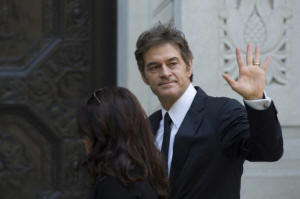|
Judge dismisses lawsuit against Dr. Oz
over fake olive oil claims
 Send a link to a friend
Send a link to a friend
 [March 04, 2017]
By Sarah N. Lynch [March 04, 2017]
By Sarah N. Lynch
WASHINGTON (Reuters) - Television
personality Dr. Mehmet Oz won a legal victory after a judge dismissed a
lawsuit alleging he violated a Georgia food libel law after making
claims on his show that some imported olive oil sold in U.S.
supermarkets could be fake.
The New Jersey-based North American Olive Oil Association filed the
lawsuit against Oz last November in the state court in Fulton County,
Georgia, seeking an unspecified amount in damages and payment for the
group's legal fees.
The group accused Oz, who hosts the syndicated "The Dr. Oz Show," of
violating a largely untested food libel law when he stated on a show
that aired last May that 80 percent of the extra virgin olive oil
imported into the country "isn't the real deal" and "may even be fake."
The group also complained that the show failed to disclose that its
featured guest and "certified oleologist" Maia Hirschbein is employed by
the California Olive Ranch, which competes directly with foreign olive
oil makers.

"We value the confidence our viewers place in us every day, including
this program which fairly reported on the mislabeling of extra-virgin
olive oil," Dr. Oz said in a statement. He added the lawsuit was just an
attempt to "stifle the show" in its pursuit of truth about what is in
America's food.
Oz and his production company sought to have the complaint dismissed,
saying the statements he made were protected under an "Anti-SLAPP" law
that shields people from having their free speech limited through abuse
of the judicial process.
The judge agreed late Thursday with the show's arguments for dismissal.
"The court has grave concerns that the motivation for the present action
falls squarely within the purpose of the anti-SLAPP statute as an
attempt to chill speech," wrote Judge Alford Dempsey, Jr.
[to top of second column] |

Television personality Dr. Mehmet Oz arrives to attend the funeral
of comedienne Joan Rivers at Temple Emanu-El in New York September
7, 2014. REUTERS/Lucas Jackson

He added that he found there were "no statements made of any kind on
the show that olive oil is unsafe for human consumption" and that
the group failed to show "a scintilla of evidence" to support claims
it suffered any financial injury.
A spokeswoman for the North American Olive Oil Association said the
group is disappointed by the ruling.
"Nothing in the decision lends credence to the unsubstantiated
attacks on olive oil made on The Dr. Oz segment and we are
evaluating our options for appeal," she said.
Georgia is among 13 states that have adopted food libel laws, which
generally have a lower legal burden of proof compared with
traditional libel laws and make it easier for food companies to sue
people who make disparaging remarks about their products.
(Reporting by Sarah N. Lynch; Editing by Alistair Bell)
[© 2017 Thomson Reuters. All rights
reserved.]
Copyright 2017 Reuters. All rights reserved. This material may not be published,
broadcast, rewritten or redistributed.
 |